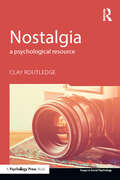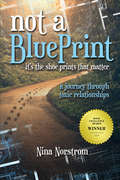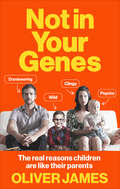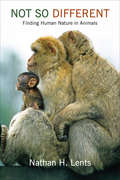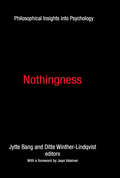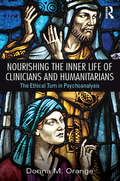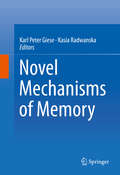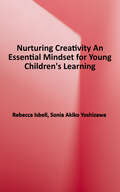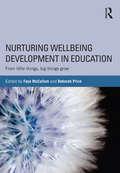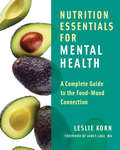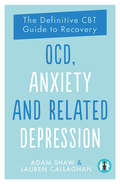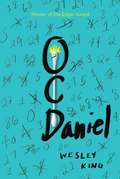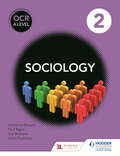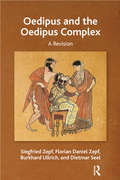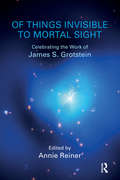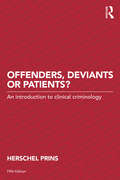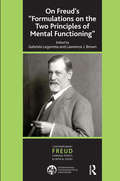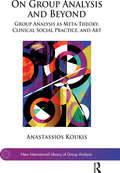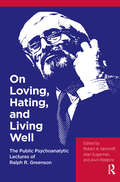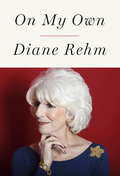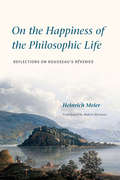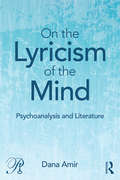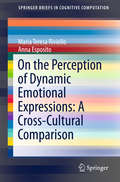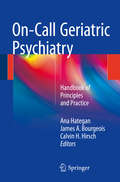- Table View
- List View
Nostalgia: A Psychological Resource (Essays in Social Psychology)
by Clay RoutledgeNostalgia is a topic that most lay people are familiar with, but, until recently, few social scientists understood. Once viewed as a disease, nostalgia is now considered to be an important psychological resource. It involves revisiting personally cherished memories that involve close others. When people engage in nostalgia, they experience a boost in positive psychological states such as positive mood, feelings of social connectedness, self-esteem, self-continuity, and perceptions of meaning in life. Since nostalgia promotes these positive states, when people experience negative states (such as loneliness or meaninglessness), they use nostalgia to regulate distress. This book explains in detail what nostalgia is, how views of it have changed over time, and how it has been studied by social scientists. It explores issues like how common nostalgia is and whether people differ in their tendency to be nostalgic. It looks at the triggers and inspiration for nostalgia, and the emotional states that are associated with it. Finally, the psychological, social, and behavioral effects of engaging in nostalgia are discussed. This volume provides the most comprehensive overview to date of the social scientific research into the complex and intriguing phenomenon of nostalgia. It will be of interest to a range of students and researchers in psychology and beyond, and its accessible writing style and engaging anecdotes will also be appreciated by a wider, non-academic audience.
Not A Blueprint: A Journey Through Toxic Relationships
by Nina NorstromAllowing us to learn lessons, let go of toxicity, and gain insight, relationship can play a powerful role in our lives. They are formed with people, alcohol, animals, battlefields, diseases, drugs, environments, and even our emotions. Whether toxic or nontoxic, relationships are an integral component of daily living. Author Nina Norstrom lost her child to a disease, but that wasn't the only toxic relationship she endured. In this book, she explores the effects that her relationships with grief, pain, trauma, and forgiveness have had on her life. This tale exposes a mother's struggle to escape her world of toxicity, her journey out of the clutches of diseased relationships, and the shoe prints the experiences have left on her family's history. This story in its raw form projects a remarkable voice to the heroic fight, courage, and bravery gained when striking back to wipe out toxic relationships. Its message reveals that life brings many challenges and that each challenge provides lessons to be learned. This book is not intended to be a blueprint for dealing with diseased relationships. It's about the shoe prints: those symbols of life's journey that are left by our experiences. "Not a Blueprint: It's the Shoe Prints that Matter" is an insightful and inspiring personal story of one family's journey through toxic relationships.
Not In Your Genes: The real reasons children are like their parents
by Oliver JamesProfessor Robert Plomin, the world’s leading geneticist, said in 2014 of his search for genes that explain differences in our psychology: ‘I have been looking for these genes for fifteen years. I don’t have any’.Using a mixture of famous and ordinary people, Oliver James drills deep down into the childhood causes of our individuality, revealing why our upbringing, not our genes, plays such an important role in our wellbeing and success. The implications are huge: as adults we can change, we can clutch our fates from predetermined destiny, as parents we can radically alter the trajectory of our childrens’ lives, and as a society we could largely eradicate criminality and poverty.Not in Your Genes will not only change the way you think about yourself and the people around you, but give you the fuel to change your personality and your life for the better.
Not So Different: Finding Human Nature in Animals
by Nathan H. LentsAnimals fall in love, establish rules for fair play, exchange valued goods and services, hold "funerals" for fallen comrades, deploy sex as a weapon, and communicate with one another using rich vocabularies. Animals also get jealous and violent or greedy and callous and develop irrational phobias, just like us. Monkeys address inequality, wolves miss each other, elephants grieve for their dead, and prairie dogs name the humans they encounter. Human and animal behavior is not as different as once believed.In Not So Different, the biologist Nathan H. Lents argues that the same evolutionary forces of cooperation and competition have shaped both humans and animals. Identical emotional and instinctual drives govern our actions. By acknowledging this shared programming, the human experience no longer seems unique, but in that loss we gain a fuller appreciation of such phenomena as sibling rivalry and the biological basis of grief, helping us lead more grounded, moral lives among animals, our closest kin. Through a mix of colorful reporting and rigorous scientific research, Lents describes the exciting strides scientists have made in decoding animal behavior and bringing the evolutionary paths of humans and animals closer together. He marshals evidence from psychology, evolutionary biology, cognitive science, anthropology, and ethology to further advance this work and to drive home the truth that we are distinguished from animals only in degree, not in kind.
Nothingness: Philosophical Insights into Psychology (History And Theory Of Psychology Ser.)
by Jytte BangThis book addresses nothingness as not only the intangible presence of an emotional, cultural, social, or even political void that is felt on an existential level, but has some solid foundations in reality. The death of a loved one, the social isolation of an individual, or the culture shock one may experience in another country are examples of situations in which an external sense of absence mirrors an internal psychological and philosophical sense of nothingness.Not much has been explicitly written on nothingness in the history of psychology. On the other hand, nothingness seems to be implicitly embedded in many scholars' work. This duality of explicitly and implicitly expressed ideas about nothingness reveals how psychology finds inspiration in philosophy, and vice versa. The book aims to illustrate how the concept of the presence of absence�nothingness�fills a void in contemporary psychological theorizing.
Nourishing the Inner Life of Clinicians and Humanitarians: The Ethical Turn in Psychoanalysis
by Donna M. OrangeNourishing the Inner Life of Clinicians and Humanitarians: The Ethical Turn in Psychoanalysis, demonstrates the demanding, clinical and humanitarian work that psychotherapists often undertake with fragile and devastated people, those degraded by violence and discrimination. In spite of this, Donna M. Orange argues that there is more to human nature than a relentlessly negative view. Drawing on psychoanalytic and philosophical resources, as well as stories from history and literature, she explores ethical narratives that ground hope in human goodness and shows how these voices, personal to each analyst, can become sources of courage, warning and support, of prophetic challenge and humility which can inform and guide their work. Over the course of a lifetime, the sources change, with new ones emerging into importance, others receding into the background. Donna Orange uses examples from ancient Rome (Marcus Aurelius), from twentieth century Europe (Primo Levi, Emmanuel Levinas, Dietrich Bonhoeffer), from South Africa (Nelson Mandela), and from nineteenth century Russia (Fyodor Dostoevsky). She shows how not only can their words and examples, like those of our personal mentors, inspire and warn us; but they also show us the daily discipline of spiritual self-care, although these examples rely heavily on the discipline of spiritual reading, other practitioners will find inspiration in music, visual arts, or elsewhere and replenish the resources regularly. Nourishing the Inner Life of Clinicians and Humanitarians will help psychoanalysts to develop a language with which to converse about ethics and the responsibility of the therapist/analyst. This is an exceptional contribution highly suitable for practitioners and students of psychoanalysis and psychotherapy. Donna M. Orange teaches, consults, and offers study groups for psychoanalysts and gestalt therapists. She seeks to integrate contemporary psychoanalysis with radically relational ethics. Recent books are Thinking for Clinicians: Philosophical Resources for Contemporary Psychoanalysis and the Humanistic Psychotherapies (2010), and The Suffering Stranger: Hermeneutics for Everyday Clinical Practice (2011), both from Routledge.
Novel Mechanisms of Memory
by Karl Peter Giese Kasia RadwanskaThis book integrates discoveries from recent years to show the diversity of molecular mechanisms that contribute to memory consolidation, reconsolidation, extinction, and forgetting. It provides a special focus on the processes that govern functional and structural plasticity of dendritic spines. In nine chapters, new and important ideas related to learning and memory processes will be presented. Themes discussed include the role of AMPA receptors in memory, two signalling cascades involved in local spine remodelling and memory, the role of extracellular matrix proteins in memory, the regulation of gene expression and protein translation, and mechanisms of retrieval-induced memory modulation and forgetting. We believe that the study of these topics represents a great step toward understanding the complexity of the brain and the processes it governs.
Nurturing Creativity: An Essential Mindset for Young Children's Learning
by Rebecca Isbell Sonia Akiko YoshizawaInspiring and supporting innovative thinking Young children have a great capacity for creativity that thrives when nurtured. Early childhood teachers have the opportunity to inspire children’s innovative thinking and doing by Including creative opportunities across all domains of learning- Designing a beautiful space that encourages children’s experimentation and play- Extending children’s learning and challenging their thinking- Documenting children’s thought processes and displaying their work- Involving families and the community in children’s creative endeavors- Reflecting on your beliefs and practices about creativity and nurturing your creativity Learn how to support children as they problem-solve, explore and share new ideas, and collaborate with others, and watch their confidence and capableness grow.
Nurturing Wellbeing Development in Education: From little things, big things grow
by Deborah Price Faye McCallumAt the core of education, the notion of wellbeing permeates both learner and teacher wellbeing. This book explores the central role and responsibility of education in ensuring the wellbeing of children and young people. Through the employment of vignettes, proactive educational wellbeing initiatives are provided to address issues pertaining to learner and teacher wellbeing, mainstream classrooms, educational marginalisation, disabilities, cyber citizens, initial teacher education and rural education. Through employing diverging theoretical approaches of; expectancy x value theory; ecological systems theory and community practices across digital imagery; case studies; questionnaires and survey methodology, the key message of the centrality of wellbeing to educational success pervades. This book provides a critical engagement with the educational discourse of wellbeing, whilst addressing issues impacting on wellbeing with worldwide implications. It offers a unique insight into both learner and teacher wellbeing and how education can contribute to enhancing wellbeing outcomes for society in general.
Nutrition Essentials for Mental Health: A Complete Guide to the Food-Mood Connection
by James Lake Leslie KornExploring the connection between nutrition and mental wellness so therapists can provide more effective, integrated treatment. Diet is an essential component of a client’s clinical profile. Few therapists, however, have any nutritional training, and many don’t know where to begin. In Nutrition Essentials for Mental Health, Leslie Korn provides clinicians with a practical guide to the complex relationship between what we eat and the way we think, feel, and interact with the world. Where there is mental illness there is frequently a history of digestive and nutritional problems. Digestive problems in turn exacerbate mental distress, all of which can be improved by nutritional changes. It’s not unusual for a deficit or excess of certain nutrients to disguise itself as a mood disorder. Indeed, nutritional deficiencies factor into most mental illness—from anxiety and depression to schizophrenia and PTSD—and dietary changes can work alongside or even replace medications to alleviate symptoms and support mental wellness. Nutrition Essentials for Mental Health offers the mental health clinician the principles and practices necessary to provide clients with nutritional counseling to improve mood and mental health. Integrating clinical evidence with the author’s extensive clinical experience, it takes clinicians step-by-step through the essentials for integrating nutritional therapies into mental health treatment. Throughout, brief clinical vignettes illustrate commonly encountered obstacles and how to overcome them. Readers will learn: • Why nutrition matters in mental health • The role of various nutrients in nourishing both the brain and the gut, the “second brain” • Typical nutritional culprits that underlie or exacerbate specific mental disorders • Assessment techniques for evaluating a client’s unique nutritional needs, and counseling methods for the challenging but rewarding process of nutritional change. • Leading-edge protocols for the use of various macro- and micronutrients, vitamins, and supplements to improve mental health • Considerations for food allergies, sensitivities, and other special diets • The effects of foods and nutrients on DSM-5 categories of illness, and alternatives to pharmaceuticals for treatment • Comprehensive, stage-based approaches to coaching clients about dietary plans, nutritional supplements, and other resources • Ideas for practical, affordable, and individualized diets, along with optimal cooking methods and recipes • Nutritional strategies to help with withdrawal from drugs, alcohol and pharmaceuticals And much more. With this resource in hand, clinicians can enhance the efficacy of all their methods and be prepared to support clients’ mental health with more effective, integrated treatment.
OCD, Anxiety and Related Depression: The Definitive CBT Guide to Recovery
by Adam Shaw Lauren Callaghan"Being in control of your mental health and understanding your own mental health wellbeing just makes everything in life better – it’s that simple." From the heart and soul of Adam Shaw, who battled OCD for decades, and the expert insight of his psychologist, Lauren Callaghan, comes the definitive recovery guide for OCD, anxiety, and related depression. This unique self-help book brings you advice and recovery tools from the separate perspectives of a leading psychologist and her patient, and gives an insight into mental health recovery and CBT techniques that you can really relate to.This second edition contains a bonus chapter on how Adam has used this approach to maintain his recovery and wellness several years on.
OCDaniel
by Wesley KingFrom the author of Incredible Space Raiders from Space! comes a brand-new coming-of-age story about a boy whose life revolves around hiding his obsessive compulsive disorder--until he gets a mysterious note that changes everything.Daniel is the back-up punter for the Erie Hills Elephants. Which really means he's the water boy. He spends football practice perfectly arranging water cups--and hoping no one notices. Actually, he spends most of his time hoping no one notices his strange habits--he calls them Zaps: avoiding writing the number four, for example, or flipping a light switch on and off dozens of times over. He hopes no one notices that he's crazy, especially his best friend Max, and Raya, the prettiest girl in school. His life gets weirder when another girl at school, who is unkindly nicknamed Psycho Sara, notices him for the first time. She doesn't just notice him: she seems to peer through him. Then Daniel gets a note: "I need your help," it says, signed, Fellow Star child--whatever that means. And suddenly Daniel, a total no one at school, is swept up in a mystery that might change everything for him. With great voice and grand adventure, this book is about feeling different and finding those who understand.
OCR Sociology for A Level Book 2
by Katherine Roberts Paul Taylor Laura Pountney Sue BrisbaneExam Board: OCRLevel: A-levelSubject: SociologyFirst Teaching: September 2015First Exam: June 2017Build students' confidence to tackle the key themes of the 2015 OCR A-Level Sociology specification with this clear and accessible approach delivered by a team of leading subject authors.- Develop knowledge and understanding of key Year 2 concepts in a contemporary context, including globalisation and the digital social world- Strengthen essential sociological skills with engaging activities at every stage of the course- Reinforce learning and prepare for exams with practice and extension questions and exercises
Oedipus and the Oedipus Complex: A Revision
by Dietmar SeelIn contemporary psychoanalytic thought, Freud's concept of the Oedipus complex is inclined to overshadow the interpretation of the myths surrounding Oedipus. The authors counter this situation by reversing it, utilizing the Oedipus myths to interpret the Oedipus complex. In so doing they expose it as a sheer cover story. They unmask the Oedipus complex, revealing it to be a drama staged not by Oedipus but by Jocasta, the mother, and Laius, the father. For neither Sophocles' drama nor the Oedipus myths give any indication that Oedipus is enamoured of Jocasta and born with the intention of killing his father Laius. What the myths do mention are Jocaste's passion for Oedipus whom she loves more than his father and Laius' desire to eliminate Oedipus as his rival from birth. Freud neglected these aspects of the Oedipal myths. In uncovering them the authors come to the conclusion that Oedipus did not have an Oedipus complex.
Of Things Invisible to Mortal Sight: Celebrating the Work of James S. Grotstein
by Annie ReinerDr James Grotstein (1925-2015) was the foremost Bion scholar, and one of the most noted and honoured psychoanalysts in the world. His prolific writings and generous encouragement to other analysts has had an enormous impact. He was among the first to examine Bion's most controversial concept - O - in particular the mystical aspects of O. The title of this book, Of Things Invisible To Mortal Sight: A Celebration of the Work of James S. Grotstein, inspired by a line from Milton's Paradise Lost (Book III), reflects Grotstein's decades-long examination of the most profound aspects of the human mind. Dr James Grotstein's erudition and depth of understanding made him one of the most revered psychoanalysts throughout the psychoanalytic world. He was well known and appreciated for his prolific writings, so it was only fitting to honour him through writing, and the fifteen articles in Of Things Invisible To Mortal Sight are written by esteemed analysts from Italy, Brazil, Argentina, Israel, and throughout the United States.
Offenders, Deviants or Patients?: An introduction to clinical criminology
by Herschel PrinsOffenders, Deviants or Patients? provides a practical approach to understanding both the social context and treatment of mentally disordered offenders. Taking into account the current public concern, often heightened by media sensationalism; it addresses issues such as sex and ‘historic sex offending, ‘hate’ crime, homicide and other acts of serious bodily harm. This fifth edition is fully updated and incorporates the latest research and reflects recent changes in law, policy and practice, including: DSM-V criteria groundbreaking work on neuro-physiological aspects of psychopathy the Coroners and Justice Act Using new case examples, Herschel Prins draws on his own expertise and experience to examine the relationship between mental disorders and crime and looks at the ways in which it should be dealt with by the mental health care and criminal justice systems. Offenders, Deviants or Patients? is unique in its multidisciplinary approach and will be invaluable to all those who come into contact with serious offenders or those who study crime and criminal behaviour.
On Freud's ''Formulations on the Two Principles of Mental Functioning'' (The International Psychoanalytical Association Contemporary Freud Turning Points and Critical Issues Series)
by Lawrence J. BrownThis book is a collection of papers by leading contemporary psychoanalysts who comment on the continuing important relevance of Freud's (1911) paper, Formulations on the Two Principles of Mental Functioning. The contributors gathered here represent current European, Latin American, and North American perspectives that elaborate the continuing value of Two Principles for present-day psychoanalytic thinking. Each author examines Freud's paper through a personal lens that is coloured by the psychoanalytic culture from which he or she comes. In each instance, the writers' chapters demonstrate the heuristic value of Two Principles for twenty-first century psychoanalytic theory and technique. A common thread that runs through all the chapters is the view that this brief paper by Freud, which he humbly introduced by stating, "The deficiencies of this short paper, which is preparatory rather than expository ...", is a masterpiece that contains within it the seeds of much of his later writing. The distinction he draws between the pleasure principle and the reality principle are profound and raise questions that still preoccupy analysis today.
On Group Analysis and Beyond: Group Analysis as Meta-Theory, Clinical Social Practice, and Art (The New International Library of Group Analysis)
by Anastassios KoukisBy extending the views of Foulkes, Bion, Freud, and Klein, this book draws the outline of a group analytic theory and meta-theory by studying the paternal and maternal functions as expressed by the conductor and the group analytic group respectively and extrapolating them to the psychoanalytic aspects of Lacan and the structuralism of Levi-Strauss's anthropological views. From this perspective, it investigates major group analytic phenomena, such as the role of money, envy, scapegoating and the regular or early ending of group therapy by patients with neurosis and borderline personality disorders. Part of the book is devoted to analyzing how eating disorders or depression in psychosis can be effectively treated and how the defective function of dreaming in psychosis can be reconstituted through group analysis, and stresses the need for research into the neural correlations of dreaming. The book further explores the ways in which group analysis can be used in the domain of the social unconscious by probing the dialectic of desire and despair in the post-modern world.
On Loving, Hating, and Living Well: The Public Psychoanalytic Lectures of Ralph R. Greenson (Monograph Series Of The Ralph R. Greenson Memorial Library Of The San Diego Psychoanalytic Institute And Society #Vol. 2)
by Ralph R. GreensonThe author, was perhaps psychoanalysis's most gifted and eloquent spokesperson. In this volume the author is presented in one of the roles he enjoyed most: communicating to a lay audience his understanding of people and life and his insights into the science and art of psychoanalysis. These important talks profoundly influenced countless professional workers and lay people. The twenty-four public lectures in this remarkable collection are each a gem of wisdom and humor. With deep psychoanalytic wisdom the author addresses such timeless and universal human concerns as love and emotional development; hate, aggression, and war; masculinity, femininity, and sexuality; jealousy, envy, and possessiveness; and the vicissitudes of child rearing and family development. Reading these entertaining public talks of the author now is like reading a chronicle of the great psychosocial issues of the past half-century. One is impressed with not only the wisdom they offer for our current concerns, but also with how revolutionary, original, and prophetic was his thinking.
On My Own
by Diane RehmIn a deeply personal and moving book, the beloved NPR radio host speaks out about the long drawn-out death (from Parkinson's) of her husband of fifty-four years, and of her struggle to reconstruct her life without him. With John gone, Diane was indeed "on her own," coping with the inevitable practical issues and, more important, with the profoundly emotional ones. What to do, how to react, reaching out again into the world--struggling to create a new reality for herself while clinging to memories of the past. Her focus is on her own roller-coaster experiences, but she has also solicited the moving stories of such recently widowed friends as Roger Mudd and Susan Stamberg, which work to expose the reader to a remarkable range of reactions to the death of a spouse. John's unnecessarily extended death--he begged to be helped to die--culminated in his taking matters into his own hands, simply refusing to take water, food, and medication. His heroic actions spurred Diane into becoming a kind of poster person for the "right to die" movement that is all too slowly taking shape in our country. With the brave determination that has characterized her whole life, she is finding a meaningful new way to contribute to the world. Her book--as practical as it is inspiring--will be a help and a comfort to the recently bereaved, and a beacon of hope about the possibilities that remain to us as we deal with our own approaching mortality.From the Hardcover edition.
On My Own
by Diane RehmIn a deeply personal and moving book, the beloved NPR radio host speaks out about the long drawn-out death (from Parkinson’s) of her husband of fifty-four years, and of her struggle to reconstruct her life without him. With John gone, Diane was indeed “on her own,” coping with the inevitable practical issues and, more important, with the profoundly emotional ones. What to do, how to react, reaching out again into the world—struggling to create a new reality for herself while clinging to memories of the past. Her focus is on her own roller-coaster experiences, but she has also solicited the moving stories of such recently widowed friends as Roger Mudd and Susan Stamberg, which work to expose the reader to a remarkable range of reactions to the death of a spouse. John’s unnecessarily extended death—he begged to be helped to die—culminated in his taking matters into his own hands, simply refusing to take water, food, and medication. His heroic actions spurred Diane into becoming a kind of poster person for the “right to die” movement that is all too slowly taking shape in our country. With the brave determination that has characterized her whole life, she is finding a meaningful new way to contribute to the world. Her book—as practical as it is inspiring—will be a help and a comfort to the recently bereaved, and a beacon of hope about the possibilities that remain to us as we deal with our own approaching mortality.
On the Happiness of the Philosophic Life
by Heinrich Meier Robert BermanOn the Happiness of the Philosophic Life presents Heinrich Meier's confrontation with Rousseau's Rêveries, the philosopher's most beautiful and daring work, as well as his last and least understood. Bringing to bear more than thirty years of study of Rousseau, Meier unfolds his stunningly original interpretation in two parts. The first part of On the Happiness of the Philosophic Life approaches the Rêveries not as another autobiographical text in the tradition of the Confessions and the Dialogues, but as a reflection on the philosophic life and the distinctive happiness it provides. The second turns to a detailed analysis of a work referred to in the Rêveries, the "Profession of Faith of the Savoyard Vicar," which triggered Rousseau's political persecution when it was originally published as part of Émile. In his examination of this most controversial of Rousseau's writings, which aims to lay the foundations for a successful nonphilosophic life, Meier brings to light the differences between natural religion as expressed by the Vicar and Rousseau's natural theology. Together, the two reciprocally illuminating parts of this study provide an indispensable guide to Rousseau and to the understanding of the nature of the philosophic life.
On the Lyricism of the Mind: Psychoanalysis and literature (Psychoanalysis in a New Key Book Series)
by Dana AmirOn the Lyricism of the Mind: Psychoanalysis and Literature explores the lyrical dimension (or the lyricism) of the psychic space. It is not presented as an artistic disposition, but rather as a universal psychic quality which enables the recovery and recuperation of the self. The specific nature of human lyricism is defined as the interaction as well as the integration of two psychic modes of experience originally defined by the psychoanalyst Wilfred Bion: The emergent and the continuous principles of the self. Dana Amir elaborates Bion's general notion of an interaction between the emergent and the continuous principles of the self, offering a discussion of the specific function of each principle and of the significance of the various types of interaction between them as the basis for mental health or pathology. The author applies these theoretical notions in her analytic work by means of literary illustrations showing how the lyrical dimension may be used to teach psychoanalytic readings of literature and explore the connection between psychoanalytic and literary languages. On the Lyricism of the Mind presents a new psychoanalytic understanding of the capacity to heal, to grieve, to love and to know, using literary illustrations but also literary language in order to extract a new formulation out of the classic psychoanalytic language of Winnicott and Bion. This book will appear to a wide audience to include psychoanalysts, psychotherapists and art therapists. It is also extremely relevant to literary scholars, including students of literary criticism, philosophers of language and philosophers of mind, novelists, poets, and to the wide educated readership in general.
On the Perception of Dynamic Emotional Expressions: A Cross-cultural Comparison
by Maria Teresa Teresa Riviello Anna EspositoThis work explores the power of visual and vocal channels, in conveying emotional cues exploiting realistic, dynamic and mutually related emotional vocal and facial stimuli, and aims to report on a cross cultural comparison on how people from different Western Countries perceive emotional dynamic stimuli. The authors attempt to give an answer to the following questions evaluating the subjective perception of emotional states in the single (either visual or auditory channel) and the combined channels: - In a body-to-body interaction, the addressee exploits both the verbal and non-verbal communication modes to infer the speaker's emotional state. Is such an informational content redundant? - Is the amount of information conveyed by each communication mode the same or is it different? - How much information about the speaker's emotional state is conveyed by each mode and is there a preferential communication mode for a given emotional state? -To what extent the cultural specificity affect the decoding of the emotional information? The results are interpreted in terms of cognitive load, language expertise and stimulus dynamics. This book will be of interest to researchers and scholars in the field of Human Computer Interaction, Affective Computing, Psychology, Social Sciences .
On-Call Geriatric Psychiatry
by James A. Bourgeois Ana Hategan Calvin H. HirschThis text covers basic principles and practice of on-call psychiatric care in the geriatric patient in various medical settings. It compiles the most likely complaints and provides assessment and management tools for each situation. Written and edited by expert geriatric psychiatrists, emergency psychiatrists, consultation/liaison psychiatrists, geriatricians, and other multidisciplinary specialists, this is the first handbook devoted to on-call geriatric psychiatry. Chapters contain an important summary of key points for managing clinical situations, case studies, and reflective questions. This text brings together relevant principles of on-call geriatric psychiatry provided in clinical settings such as emergency, acute and subacute inpatient, outpatient, residential, correctional, and consultation/liaison. It includes clinical topics such as psychopharmacology, psychotherapy, substance abuse, and includes coverage of medical ethics and the law, utilization of contemporary technology, and administrative and public health policy. On-Call Geriatric Psychiatry is the first practical guide to knit together evidence-based medicine and geriatric psychiatric principles and practice guidelines and is a valuable resource for trainees, psychiatrists, geriatricians, emergency departments, nursing home physicians, and other health professionals working with older adult patients.
